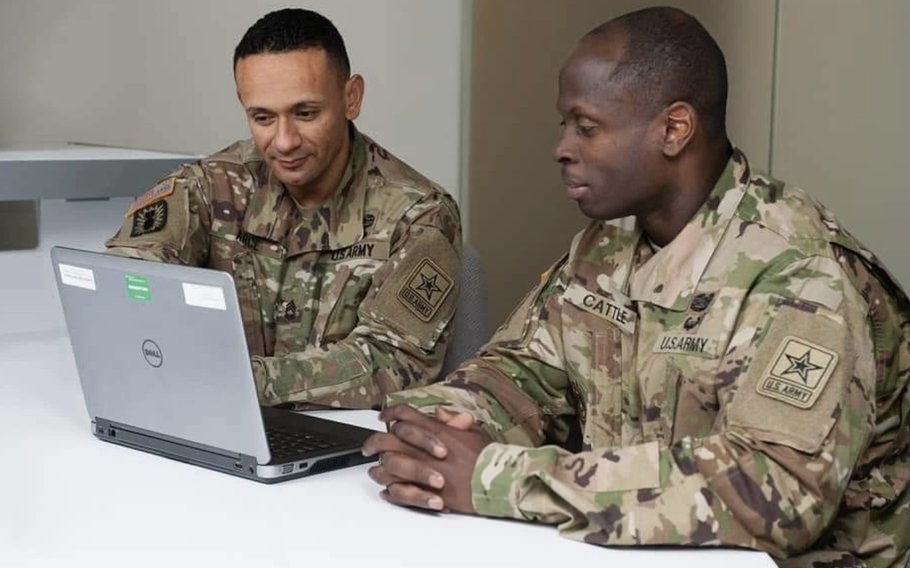
A soldier at Fort Knox, Ky., receives guidance in 2020 on moving from military to civilian life as part of the transition assistance program. Known as TAP, the program aims to prepare separating military service members for the move, providing information on disability benefits, education assistance and health care, among other resources. A bill under review in Congress would allow veterans service organizations to attend TAP classes and work one-on-one with military members. (U.S. Army Human Resources Command)
WASHINGTON — A bill before Congress would jumpstart benefits for separating troops by authorizing accredited veterans organizations to place counselors in Defense Department transition assistance programs designed for service members preparing to leave the military.
The transition assistance programs, known as TAP, are mandated classes for separating service members. The program is designed to connect active-duty troops with information that they will need as civilians to receive disability compensation, health care and education assistance, among other benefits.
“The overarching theme is to make sure applications for the benefits they need are initiated before they leave service,” said Patrick Murray, the director of national legislative services for the Veterans of Foreign Wars. “Our folks can sign up service members on the spot. They can get the process rolling.”
The VFW now deploys full-time service officers at two dozen military bases to offer the one-on-one assistance at TAP classes.
VFW counselors interact with about 10% of the total separating force of 200,000 troops each year, Murray said.
“TAP reforms are an incredibly important issue for the VFW and its membership,” he said. “We want to see services like this offered across the Defense Department and not just where organizations like ours operate.”
Though the Disabled American Veterans and Wounded Warrior Project also send representatives to TAP classes, Murray said access varies depending on the willingness of base commanders.
But Rep. Derrick Van Orden, R-Wis., a retired Navy SEAL, aims to change that through legislation designed to make TAP operate more effectively.
In March, he introduced the Enhancing Transitioning Servicemembers’ Experience Act, which would enable veterans organizations to place counselors in TAP classes at military bases across the United States.
Rep. Mike Bost, R-Ill., who is chairman of the House Committee on Veterans’ Affairs, is a co-sponsor of the legislation.
Van Orden, who is the chairman of the House Committee on Veterans’ Affairs subpanel on economic opportunity, said the bill would make fundamental changes to TAP to ensure it stays relevant and has value to service members.
The bill would require TAP classes to be conducted in person, when possible, create a separate TAP track for National Guard and reserve members and provide increased base access for veteran service organizations to participate, as they help separating service members understand their benefits.
“TAP is an integral part of a service member’s transition from being a productive member of the military to a productive member of American society,” Van Orden said.
Murray said counselors can act as a clearinghouse and field questions about the information on benefits and other resources received during TAP classes. Service members often find the information overwhelming.
“There is too much information delivered in a very little amount of time,” Murray said some troops have told him. “There is little-to-no context for what they are getting.”
Though TAP classes are mandated for service members, some veterans report their commanders downplayed or discouraged attendance.
That was the experience of Adrian Anthony, a former Army private who served from 2000-2004, with deployments to Germany and Iraq.
“I went to class where we got help writing resumes but that was it. I was excused from the rest of it. Honestly, I am not sure why. My sergeant just said I didn’t need to go,” he said.
Anthony said he “didn’t even know the [Department of Veterans Affairs] existed” until 2008 — four years after he left military service, when the wife of a Desert Storm veteran reached out to him.
He said he often reflects on how gaining information about health care and other benefits prior to discharge would have eased his transition to civilian life.
“I am 100% disabled because of severe PTSD,” Anthony said, referring to post-traumatic stress disorder, a mental health condition he said he developed from the “violence and casualties” that he witnessed in combat in Iraq.
“I did not get my disability rating for PTSD until 2013 — years after being homeless and begging for help before it happened,” he said. “I just knew something was wrong in my head. I have flashbacks and night terrors. Not knowing that I had PTSD was worse than finding out I had a mental health problem and there was help available all along.”
Using his veterans benefits, Anthony, 42, recently graduated college.
He said he has been accepted into a master’s program in criminal justice and plans to use the GI Bill to help fund his education.
Murray said the VFW primarily works at TAP classes on disability claims, which enables qualifying veterans to access health care and compensation sooner for service-connected illnesses and injuries.
But he said military members also have “the opportunity to sit across the table from a veterans service officer who can guide them through the process.’’
“This program allows us to see the needs of troops and help them in real time,” Murray said.